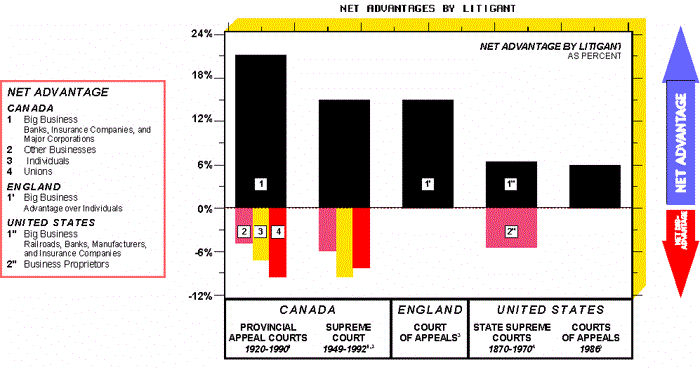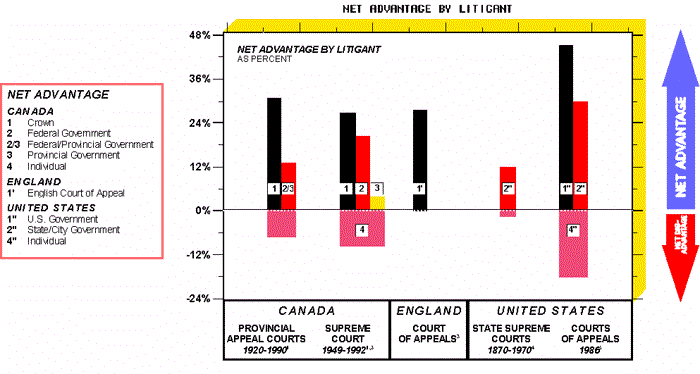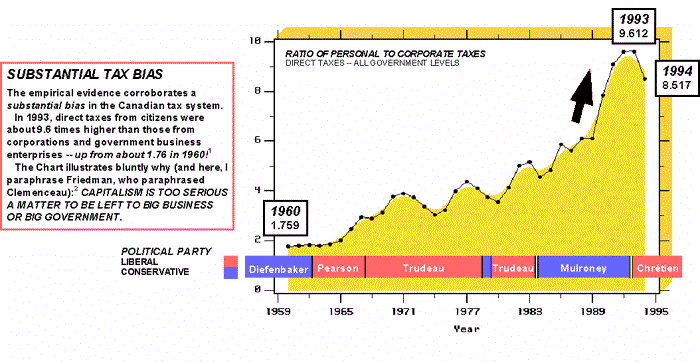  |
|
|
CHAPTER 6
Law and Order
Friedman asserted that law
and order are necessary to "prevent physical coercion" and to "enforce
contracts."1 It follows that:
TO MANIPULATE THE
MARKETPLACE, ONE MUST MANIPULATE THE LEGISLATIVE AND JUDICIAL SYSTEMS.
The findings of P.
McCormick,2 D.R. Songer and R.S. Sheehan,3 B.M. Atkins,4 and S. Wheeler et al.,5 indicate that the judicial systems
in Canada, in the United States, and in England have not been immune to vicissitudes. These
systems have been manipulated to give, apparently, not slight, but substantial "net
advantages" to Big Business and Big Government -- over Citizens. These
important empirical findings are not inconsistent with the qualitative findings of Adam
Smith, over two centuries earlier. It does not matter if Big Business or Big Government
obtained net advantages because of their so-called "party capability."
What does matter is that these net advantages are real -- and, in a Democracy,
unacceptable.
Powerful evidence from
direct taxes also corroborates the fact that Governments have been manipulated to provide net
tax advantages to Big Business over Citizens. In 1993, the ratio of personal to
corporate direct taxes in Canada was an incredible 9.61 -- up from 1.76 in 1960!
|
|
| 1
See Milton Friedman, Capitalism and Freedom, 1962 and 1982, at 14-15 (law and
order). 2 P.
McCormick, Party Capability Theory and Appellate Success in the Supreme Court of Canada,
1949-1992, Canadian Journal of Political Science, Vol. 26, No. 3, September 1993,
at 523-540; and Canada's Courts, 1994, at 152-167.
3 D.R. Songer and
R.S. Sheehan, Who Wins on Appeal? Upperdogs and Underdogs in the United States Courts of
Appeals, Journal of Political Science, Vol. 36, 1992, at 239 and 243-246.
4 B.M. Atkins, Party
Capability Theory as an Explanation for Intervention Behavior in the English Court of
Appeal, American Journal of Political Science, Vol. 35, 1991, at 881.
5 S. Wheeler et al.,
Do the 'Haves' Come Out Ahead? Winning and Losing in State Supreme Courts, 1870-1970, Law
and Society Review, Vol. 21, No. 3, 1987, at 403-445. |
|
NET LITIGATION ADVANTAGE OF BIG
BUSINESS
EMPIRICAL
EVIDENCE OF BIAS AGAINST SMALL FIRMS, INDIVIDUALS, AND WORKERS |
 |
Plate 6-1
Net Litigation
Advantage of Big Business: Empirical Evidence of Bias Against Small Firms, Individuals,
and Workers -- Selected Findings from McCormick, Atkins, Wheeler et al., and Songer and
SheehanThe Chart consolidates selected data
from several sources:
1 P. McCormick, Canada's Courts, 1994, at 152-167 (Canadian Provincial
Appeal Court Decisions, 1920-1990; summary of the findings of Atkins (1991), Wheeler et
al. (1987), and Songer and Sheehan (1992)).
2 P. McCormick, Party Capability Theory and Appellate Success in the Supreme
Court of Canada, 1949-1992, Canadian Journal of Political Science, 26 (3),
September 1993, at 523-540 (Supreme Court of Canada decisions, 1949-1992).
3 B.M. Atkins, Party Capability Theory as an Explanation for Intervention
Behavior in the English Court of Appeal, American Journal of Political Science, 35,
1991, at 881 (English Court of Appeal decisions).
4 S. Wheeler et al., Do the 'Haves' Come Out Ahead? Winning and Losing in State
Supreme Courts, 1870-1970, Law and Society Review, 21 (3), 1987, at 403-445
(U.S. State Supreme Courts decisions, 1970-1970).
5 D.R. Songer and R.S. Sheehan, Who Wins on Appeal? Upperdogs and Underdogs in
the United States Courts of Appeals, Journal of Political Science, 36, 1992,
at 239 and 243-246 (U.S. Court of Appeals decisions, 1986).
[Copyright © 1998 by
MACROKNOW INC. All rights reserved.]
|
|
NET
LITIGATION ADVANTAGE OF BIG GOVERNMENT
EMPIRICAL
EVIDENCE OF BIAS AGAINST INDIVIDUALS |
 |
Plate 6-2
Net Litigation
Advantage of Big Government: Empirical Evidence of Bias Against Individuals -- Selected
Findings from McCormick, Atkins, Wheeler et al., and Songer and SheehanThe
litigation power of the State as appellant over the individual is clearly demonstrated.
This power appears to be substantial, systematic, and entrenched. In a Democracy, any lack
of "fairness" and "objectivity" by the judicial system is absolutely
unwelcome. How did this asymmetry in net advantages arise? Did the Judiciary sacrifice
some individual freedoms and some fairness for administrative efficiency? Did the
Legislature give, by design, "slight advantages" to the State in order to
increase the Darwinistic fitness of the State? The Rule of Law can be deliberately
manipulated to increase the concentration of economic and political power of a few
dominant groups, at the expense of the People. Will the People, to use the words of Alexis
de Tocqueville, continue to be "a flock of timid and industrial animals"?
Chart adapted from several sources. See previous Plate for
sources.
[Copyright © 1998 by
MACROKNOW INC. All rights reserved.]
|
|
TAX ADVANTAGE OF BUSINESS OVER
CITIZENS
EVIDENCE
FROM DIRECT TAXATION IN CANADA -- ALL GOVERNMENT LEVELS |
 |
Plate 6-3
Empirical
Evidence of Unfair Tax Burden for Persons in Canada: The Ratio of Personal to Corporate
Taxes -- Direct Taxes, All Government Levels, 1960-1994Big Business has gained substantial
tax advantages over Citizens from Big Government. The notion that the marketplace is
"free" is not only a myth but a mockery. The ratio of direct taxes from
persons to direct taxes from corporations and government business enterprises increased
under both the Liberals and the Progressive Conservatives. The ratio first
increased under Trudeau, then skyrocketed to about 9.61 under Mulroney. Both parties paid
heavily for their bias. Frustrated Citizens struck back at federal election time:
they defeated the Liberals (the number of Liberal seats in the House of Commons dropped in
1984, from 147 to 40), then almost smashed the Conservatives (the number of PC seats in
the House of Commons was chopped in 1993, from 169 to just 2!).3 The
unfortunate irony is that the despotism of greed has no political affiliation.
Sources:
1 Ratios derived from data in Statistics Canada, Canadian Economic Observer,
Historical Statistical Supplement 1994/1995 (direct taxes from: persons, and corporate
and government business enterprises).
2 Milton Friedman, Capitalism and Freedom, 1962 and 1982, at 50-51
("money is much too serious a matter to be left to the Central Bankers").
3 J.R. Colombo (ed.), The 1996 Canadian Global Almanac, 1996, at 148
(Prime Ministers of Canada), and 173 (Federal Election Results, 1988-1993).
[Copyright © 1998 by
MACROKNOW INC. All rights reserved.]
|
|

|


